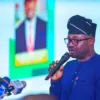Governor Abba Yusuf on Wednesday presented a ₦1.368 trillion proposed budget for the 2026 fiscal year to the Kano State House of Assembly, describing it as “a covenant to consolidate gains, complete key projects, and build lasting systems that serve generations to come.”
The budget, tagged “Budget of Infrastructure, Inclusive Growth and Sustainable Development,” places strong emphasis on capital investment. Of the total proposal, ₦934.64 billion is allocated to capital expenditure and ₦433.48 billion to recurrent spending — a 68:32 capital-to-recurrent ratio that reflects the administration’s development-focused priorities.
Governor Yusuf said the budget’s structure demonstrates his government’s resolve to finish ongoing projects while enabling new initiatives. It is, he noted, “built around completing legacy projects, consolidating gains and enabling new initiatives.”
A substantial share of the spending plan is directed at the social and economic sectors, with Education, Health, and Infrastructure receiving the highest allocations.
According to the governor, Education will receive ₦405.35 billion (30%), Health ₦212.25 billion (16%), and Infrastructure ₦346.29 billion (25%). These figures, he said, provide “clear evidence of our commitment to nurturing human capital development, safeguarding the well-being of citizens, and laying the physical foundation for sustainable development.”
Other sectors receiving significant funding include agriculture, security, water resources, commerce, tourism, youth development, women’s affairs, and environment and climate change.
‘We have implemented over 80% of our blueprint’
Reviewing his administration’s performance since 2023, Governor Yusuf told lawmakers that his team has delivered most of its pledges.
“It is gratifying to note that over 80% of our administration’s blueprint has been successfully implemented,” he said, adding that the government remains “resolute in continually improving the betterment of our citizens.”
He urged the Assembly to help ensure that the budget produces tangible improvements across the state: “Let us ensure that this budget does not remain on paper but translates into roads, classrooms, clinics, jobs, empowerment, and dignity for the people of Kano State.”
The governor commended the Assembly for what he described as exceptional collaboration.
“Since my assumption of office in May 2023… I have enjoyed the highest level of cooperation and respect from all of you, irrespective of political differences,” he said, expressing hope that the partnership would endure.
He also thanked citizens for their “unwavering goodwill and trust,” and acknowledged the contributions of ministries, MDAs, development partners, civil society groups, and technical teams involved in drafting the budget.
As his administration enters the latter part of its tenure, Yusuf emphasized the need for urgency and focus.
“We are nearing the completion of the third quarter of our four-year mandate. This moment marks a critical juncture, one that demands renewed urgency and focused implementation as we race against time,” he said.
Presenting the Appropriation Bill, he concluded with prayers: “May Allah (SWT) continue to guide our steps, bless our efforts, forgive our past, bless our present, and guide our future.”
The 2026 Appropriation Bill now awaits legislative scrutiny and passage by the Kano State House of Assembly.


